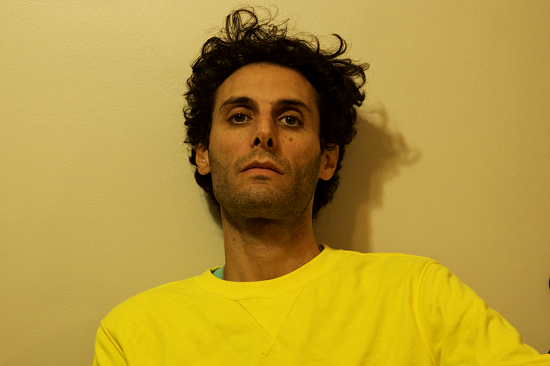Photo courtesy of Nicos Kennedy
A decade ago, Bonnie Baxter came across dozens of hours’ worth of tapes that had been recorded by her mother between the 1970s and 1990s. Her mother suffers from severe OCD and Tourette’s Syndrome, and found that making the tapes helped her cope with her condition. Baxter’s childhood had been traumatic in ways separate from her mother’s condition – she was sexually abused by a neighbour at a young age – and those of the recordings that had been made during her childhood caused her to return to her most difficult years in search of clarity; trauma, particularly when suffered as a child, can often cause significant problems with memory. “I started trying to find answers to things that had happened to me at three or four years old,” she says. Her husband Nicos Kennedy, who is also her bandmate in Kill Alters, tried to help. They’d return to significant areas from her past in the vague hope of accessing buried information.
In the process, they came across the comedian and satirist Barry Crimmins. He too had survived sexual abuse as a child, and before his death from cancer in 2018 had dedicated much of his life to campaigning on the issue, as documented in Bobcat Goldthwait’s 2015 documentary Call Me Lucky. “He was actually going out and catching abusers, going into chat rooms and stuff,” says Baxter. They became regulars at his shows in their then home of New York City, and after a while they befriended him. “He basically told us to start moving forward. ‘Love each other and do your art’” Kennedy recalls. “It was the best advice anyone ever gave us.” They realised that their relationship to the tapes had to change. “It was becoming investigative, and it was getting really intense, in a way that was just so dark,” says Baxter. They started chopping them up into little whacked-out snippets, uploading them to Bandcamp one by one as the Kill Alters Archive.
As they did so, Baxter gradually began to process the emotional lurch that came with hearing the tapes. “When I was first going through them, I felt victimised, but it started to shift towards a point where I felt like I was more of a survivor.” Much of that processing came through making music out of them, for which Baxter and Kennedy started their band, Kill Alters, a trio completed by drummer Hisham Bharoocha. “It started to shift towards a place where I felt like I was more of a survivor. I felt power and control.”
Some of the tapes, on which Baxter’s mother is clearly struggling, were an extremely difficult listen, but others were of a different tone entirely – “There’s also stuff on there that’s funny, creative and musical… we always think that Madlib would have a field day if he had this shit!” says Kennedy – and with Kill Alters, they embraced this entire emotional spectrum. Some of the music on the first two mini-albums Kill Alters released, 2015’s Kill Alters and 2016’s No Self Helps, is incredibly abrasive and uncomfortable, like when droning electronics sound beneath a tearful recounting of violent abuse on ‘My Father’, and some of it is blisteringly manic, Baxter’s frenzied vocals letting rip over relentless hammering noise.

Nicos Kennedy
And then, there are parts where the tapes contain little more than innocent babbling, and others that are simply funny, particularly on No Self Helps (on which they had purposely tried to lighten the tone a little). Closing track ‘Wart Therapy’ makes the best example, a skit recorded on Baxter’s phone in 2016 that sees her mother ad-libbing the role of a chaotic doctor, and Baxter a patient with a wart. It demonstrates that at the same time as exploring Baxter’s trauma, Kill Alters’ music also embraces the deep bond that has always existed between the two women despite it all. “My mom’s funny as hell,” Baxter says with fondness. “She’s got all these ailments, and she was also seriously physically abused as a child, but she found her way through humour. If she was having a Tourette’s attack, she’d rather that people laugh and be open with her than look at her in scorn. That’s the way that she’s coped, and it bled into me.”
For all the emotional range of the mini-albums, however, they were still striving to achieve the right sound. As experimental musicians trying to make a living in New York City, time and resources were extremely scarce. “It’s a massive undertaking to produce a whole record yourself with no money, no producer, no engineer,” he says. “It was hard to keep working on this record while also trying to do our side jobs and gig.” A brief lifeline came when Kennedy was assisting XL Recordings’ Alex Epton in the studio, who offered some time to professionally record Bharoocha’s pounding drums, but by the end of 2019, after almost four years of work on the full-length LP, they were on the verge of giving up entirely.
As a last ditch effort, Kennedy broke the demos back down to acoustic guitar, then started building them back up again from scratch. “The songs are fucking amazing, I just needed to find a way for that to translate on the record.” He decided to “eat a bunch of weed edibles and start doing things I had never done before with EQ and volume.” Those years-old recordings of Bharoocha’s drums were cut up, edited, sampled and twisted in order to open up entirely new rhythms. “The results were emotive enough to keep us pressing on.” At this point Baxter, who is also a prolific solo artist, and one half of the duo Prolaps with Machine Girl’s Matt Stephenson, had all but disengaged from the project entirely. “I want the instant gratification of throwing things up real quick, things being super experimental,” she says. The idea of returning to the more traumatic elements of the tapes was difficult too. “I felt like, ‘I’ve worked all this stuff out, I need a break from it. I don’t wanna think about that time right now.’ I wanna have fun and do this other stuff that’s disconnected from me talking about my past.”

Bonnie Baxter
Then, the pandemic arrived. “Everything we were making money on was gone. We lost our apartment, we got flushed out of New York City. We were living month to month.” Though they’d take part in the occasional livestream, once again the Kill Alters album was disrupted. They stayed with family outside of the city for a while, until they were stable enough to make the move to the more affordable Pittsburgh. Their friends in Machine Girl had just moved there too. In 2021, they were finally able to resume their work with the tapes, for which Kennedy needed Baxter to re-record her vocals and re-write a number of synth parts. “It was hard for me to go back in,” Baxter admits. “I felt so disconnected at that point, and then Nicos is like ‘we have to replace this sound here and this sound here, you have to sit with me and rewrite this part and rewrite that part…’ It was painful!”
Kennedy’s efforts so far had been so transformational, however, their hour and a half of sprawling demos now condensed into a ferocious and compact 35 minutes, that she relented. “I felt like if we didn’t finish it, I would definitely regret it. Even when I didn’t want to work, or wasn’t feeling connected to the song, there was enough there that it just had to be finished.” In order to reinject some life into her vocals, they compiled a playlist of inspirational singers from the 1980s – all female, with the exception of Def Leppard. “What we realised is that all these vocals were not perfect, not edited to death. It’s just visceral. It’s out of tune, but I got chills…”
It says a lot about the progress Kennedy has made as a producer that with Kill Alters’ debut album proper now finished at last, it doesn’t sound at all like the product of a laboured and fragmented recording process. Rather, Armed To The Teeth L.M.O.M.M. is a record that blazes with momentum, flowing effortlessly from one song to another, ascending peaks of intensity and plummeting into deep wells of meditation in smooth sweeps. It’s the kind of music that you’d imagine as being recorded in exactly the kind of frenzied burst that Baxter was so reluctant to depart from in the first place. Although, she affirms, “We’d never do it this way again,” neither of them regret the process that led them to this point. “I think we needed that learning, growing phase. I realised that I was wanting to make stuff so quick that I wasn’t really fleshing things out.” Adds Kennedy: “We are now able to move 20 times as fast. It’s given us a lot of power to be more visceral and instinctive in our music which was so much more important.”

Photo by @m1lkmansmolotov
After six years of work with the tapes, through a time of considerable personal upheaval, you can forgive Kennedy for his obvious pride in the results. “I drove myself crazy, I don’t think anyone else has listened to this record as much as I have since 2016,” he says. More than anything, though, he feels a sense of relief. “It had become this weird, compulsive thing that I just really wanted to get done and stop talking about.”
Ultimately, Armed To The Teeth is the sound of Kill Alters emerging triumphant at the end of not one, but two long and arduous processes. They have battled through the barriers of limited time, resources and financial stability that come with independent musicianship in the 21st century, and at the same time, Baxter says, she has reached “so many layers of closure” after the emotional tumult that came with confronting her past. She will keep woking with the tapes in the future, “but it’s no longer painful to listen to. I’ve gone through all the different emotions, and I can use it now as if I’ve just stumbled across some really cool sounds.”
It’s fitting, the band say, that they’re releasing the record on cassette. It’s a visual reminder, they say, of those mountains of tapes that, ten years ago, kickstarted these two long processes. On the cover is an image of Baxter aged four, standing amid a clutter of chairs and fabrics, her face staring outwards, that would have been taken around the time she was being abused. The album’s name, Armed To The Teeth, “is the final stamp on that story,” says Kennedy. “That little girl in the picture is now armed to the teeth with this record. This record is that battle won. We’ve spoken for that four year old, and that four year old is now strong as fuck.”
Armed To The Teeth L.M.O.M.M. is released on February 11 via Hausu Mountain


